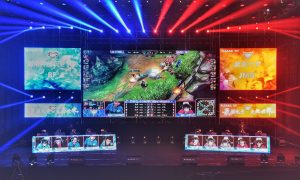South Korea’s League of Legends team breezed through its first day of esports competition Monday at the Asian Games, bolstered by a strong performance by top player Lee Sang-hyeok.
Lee, better known in the online gaming world as “Faker,” and his four teammates beat Hong Kong to open the day and then dispatched Kazakhstan in a one-sided match that lasted only about 17 minutes in an esport where tournament games are often double that.
“Today’s games went really well, just as we had anticipated,” the 27-year-old Lee said.
As the global games market continues to boom in numbers of players and revenue, esports takes its place this year at the Asian Games as a competition sport for the first time and so far it has been an audience favorite.
League of Legends is one of the most popular games, where two teams of five powerful champions face each other in a bid to destroy the other’s base.
Lee locked in the champion Yone for the game against Kazakhstan.
For the South Korean players, there’s more at stake than just national pride — the country exempts any men from compulsory military service if they win gold medals at the Asian Games.
Lee said he had recovered from hand and arm pain that had sidelined him earlier in the year.
“I feel much better now. I don’t need any more treatment,” he said. “I don’t think the injuries will have a significant impact on the games.”
With the two wins, South Korea advances to play Saudi Arabia in the quarterfinals on Wednesday. Vietnam will meet India after wins over Japan and the Palestinian team.
South Korea and China are the favorites in the League of Legends competition, and Hong Kong player Chau Shu Tak said he cursed when he saw that his team had drawn a match with South Korea to open the tournament.
“They’re very powerful players here,” said the 19-year-old Chau, who plays under the name YSKM — You Should Know Me.
Lee, known by many as the League of Legends GOAT — Greatest Of All Time — is a celebrity in game-crazy China and he was greeted by more than 100 fans as he arrived at Hangzhou airport last week.
There was no way for them to see him play in person on the opening day of League of Legends competition, however, as the main arena in Hangzhou’s purpose-built esports stadium hosted the semifinals of Arena of Valor, Asian Games Version, also known as Honor of Kings.
Malaysia’s team beat Vietnam in the opening game of that competition, played in the 4,500 seat hall where competitors sit at terminals in the center and spectators can follow along on big-screens overhead. China beat Thailand in the afternoon game.
That means Vietnam and Thailand face each other for the bronze medal match on Tuesday, and Malaysia and China will contend for gold.
Those will be the first medals awarded for esports.
For the opening rounds of League of Legends, the teams played in the lower level of the arena, in small rooms with only officials present.
They brought in their own keyboards and mice, and sat at gaming chairs at long tables facing the opposing team, communicating to one another through headsets.
Media were able to watch through a video link to the room.
Esports was first featured at the last Asian Games in Jakarta, Indonesia, as a demonstration sport and proved incredibly popular. It is the only event at this year’s Asian Games where spectators can only purchase tickets if selected through a lottery system.
The Asian Games also includes other “mind games,” like bridge and chess.
The International Olympic Committee has looked longingly at the potential of video gaming and virtual sports to help attract and stay relevant with young audiences, and created a formal esports commission this month with a focus on virtual sports.
The Asian Games esports competition features five PC games and two mobile games, covering both multiplayer online battle arena, or MOBA, and single-player genres.
In addition to League of Legends and Arena of Valor, the lineup consists of: Peace Elite Asian Games Version (also known as PUBG Mobile); Dota 2; Dream Three Kingdoms 2; Street Fighter V: Champion Edition; and EA Sports FC (also known as FIFA Online 4).
Competition forms vary with the genre but gold medals will be awarded for each game.
Newzoo, a research company that specializes in tracking the global games market, projected in its annual analysis released last month that the number of players worldwide will reach 3.38 billion in 2023, up 6.3 percent year-on-year. Annual revenues are expected to grow 2.6 percent to $187.7 billion.

































